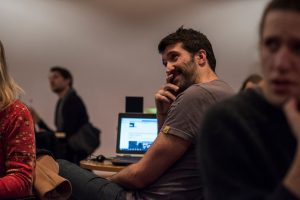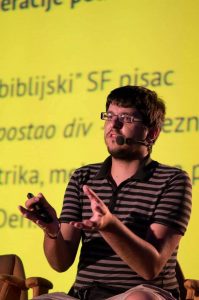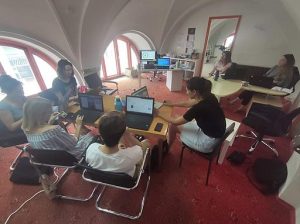In 2020, AfLIA welcomed Alice Kibombo of the Wikimedia Community User Group – Uganda as a Wikimedian in residence. IFLA is delighted to see this initiative coming to life and therefore invited Ms Kibombo to share project’ insights with the international library community.
Could you tell us about your background and how you came to Wikimedia projects?
I am a practising librarian as well as an active volunteer/editor based in Uganda. I regularly contribute to both English and Luganda Wikipedia, Wikidata and WikiSource.
Coming into Wikimedia projects? Let’s see… as much as I would like the narration to be a bit more romantic, I am what would be classified as an accidental Wikipedian. I was contributing individually until my boss sent someone to the library because she just did not know what to make of what they wanted. It turns out, he was active with the Wikimedia Community User Group Uganda and they were looking for a library to partner with and host them for a number of activities. Gradually, a number of Wiki-related projects such as WikiLovesWomen in 2017 came in and provided me with the opportunity to get involved with the administrative side of things and the rest is current affairs (see what I am responding to now…)
Since then I have contributed a number of articles and been the beneficiary of various regional training, learning days and scholarships which to a large degree prepared me for my current assignment.
Which Wikimedia projects will be considered and why are they relevant to libraries?
Our primary project of focus is Wikipedia – the encyclopaedia project of Wikimedia. As often stated, libraries and Wikipedia have an overlapping mission which is to provide reliable information through verifiable references and doing proper research to bring quality, accurate information to the world. Wikipedia is as good as its sources and when it comes to libraries, not only do we have the best sources but the experts on these sources. Let’s just say that we should consider Wikipedia as an extension of the work we do albeit in the free knowledge movement.
In addition, library resources, in a number of forms, are relatively invisible on the web and while Wikipedia emphasises quality resources, some of what’s accessed are relatively sub-par because of the sources.
To be addressed in the course will be Wikimedia Commons, Wikidata and WikiSource will be addressed in the near future as Wikidata deals with linked data which is the “thing” right now.
As a Wikimedian in residence at AfLIA, what are your goals and next steps to get started?
This I believe is a turning point for all parties – mind you, it has not been attempted before on the continent, well not on such a scale and it is a testament to the benefits of a partnership. There are both personal and institutional goals but both AfLIA and the Wikimedia Foundation (and loudly, I, in the background) agree on some aspects :
We have talked a lot about being able to represent our facts and tell our stories thus the focus on local languages and CCC (Cultural Context Content). The course (which is an adaptation of the will be conducted in English, French and Portuguese but the skills and content therein are very much translatable to a local context. Call it decolonising our realities.
In terms of training/ skills/ empowerment which is really the bulk of the work, this is already underway – we recently had the honour of “wrapping up” with the pilot cohort who as a group gave us very valuable insights which we were able to incorporate into the material for the main cohort. We are hosting the first main cohort between February 1 st and April 24th and if the number of responses is the only indicator of success, then I can say it has been received positively or our networks served us well or both.
Through a pre-course survey, 54% of respondents reported that they were not aware of any Wikimedia community in their locale. Keep in mind that a number of African wiki communities also reported limitations in their ability to initiate GLAM-related initiatives since they had no access to the network that is the librarian community in Africa. This, therefore, provides the project with the opportunity to nurture relationships between these two communities and hope that the results will be worthwhile.
At this point I need to mention that I do not work alone, I see myself merely as a liaison between this particular outreach of the Wikimedia Foundation and AfLIA’s step in fulfilling its core objectives. We do have all these interesting projects lined up and which you will be hearing about in the near future.
How could the library community support these projects?
The experience with the pilot cohort brought to the fore a number of issues – we knew they existed, we just did not know the depth to which they ran. First, there was a huge disconnect between the librarians’ community in Africa and Wikipedia! 54% of a group of information professionals not knowing about their potential partners in the Free Knowledge movement begs a lot of questions!
With that in mind, we are training librarians from over 30 countries in Africa so we constantly encourage institutional buy-in for them to realise the benefits of such training for their staff. From personal experience, you would be surprised outright negativity we have to deal with and I do commend the librarians who have made an individual effort to be part of this project
With the situation presented by COVID-19, the library community has not been spared the reality of being increasingly distributed and virtual and now more than ever, driven by heterogeneous interests in both training and content. I would therefore encourage information institutions to engage with the librarians we are training on thematic contribution where possible. Depending on the nature or mission of the institution, some may focus on image release, others on community engagement, others on content generation.
The project would benefit greatly from the shared expertise of librarians who have also experienced Wikipedians. A good number work in isolation so if and when they read this, perhaps they should contact us.
Lastly, this presents an opportunity for the community to engage in alternative pathways to individual development mainly by supporting the human resource they have. Institutions and individuals that may not for example offer space could offer publicity or actively encourage their staff to participate in programs such as these, offer access to hard-to-access resources eg those behind paywalls or historical collections to support thematic engagement
Would you like to add anything?
Lots and lots and some more – it’s hard to choose without writing a whole dissertation. Since I have and cannot fully exhaust whatever it is on this here forum, a lot is happening
You can also keep yourself updated by visiting the project page and following us on social media.
To us, the Free Knowledge movement is not the last frontier as much as it is a new frontier. I like to think with this project that and this project is mutually beneficial.


